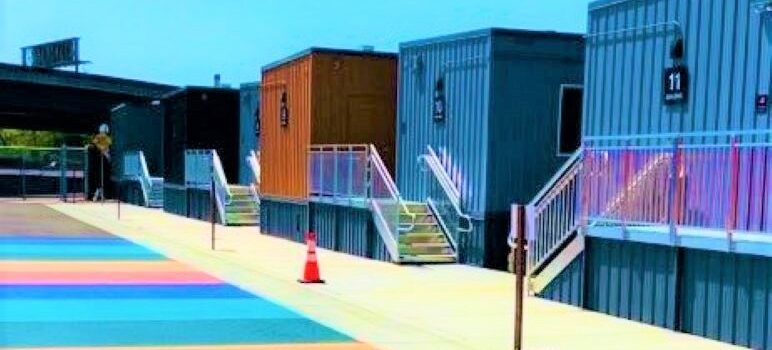San José Mayor Matt Mahan today announced his endorsement of a new state bill, SB 634, that if passed, would make it easier to deploy temporary, movable housing on vacant land— which can be used to house thousands of homeless Californians.
The bill is authored by State Sen. Josh Becker (D-San Mateo) and co-sponsored by the San Francisco Bay Area Planning and Urban Research Association (SPUR) and Bay Area Council, and supported by DignityMoves.
“SB 634 will accelerate our ability to build basic, safe shelter and move people indoors so that we can end the era of encampments,” said Mahan. “We can no longer afford to take incremental action to address our homelessness crisis.”
Building permanent affordable housing can cost upwards of $1 million per unit and take five years to build in San José. The so-called “quick build” alternatives are more cost-effective and take a fraction of the time to build, according to Mahan, who has made them a cornerstone of the city’s efforts to reduce unsheltered homelessness.
Mahan said the city needs what he is calling an “all of the above approach,” and has set a goal of moving 1,000 people off the streets and into safe alternatives via quick-builds, safe parking, hotel vouchers and other means by the end of 2023.
“Opportunity housing is the most hopeful development I’ve seen to address our homelessness crisis at scale and with speed,” said Becker in a statement. “My goal with this legislation is to get tens of thousands of people off the street in the next few years and I’m confident we will do that. The opportunity housing model is breaking ground throughout the state and SB 634 will allow the model to efficiently ramp up production to house our unsheltered neighbors.”
“While permanent housing is the ultimate long-term goal, we cannot let our streets be the waiting room in the meantime,” said Elizabeth Funk, founder and CEO of DignityMoves. “We are thrilled to see cities like San José and leaders like Senator Becker embracing innovative solutions that have the potential to finally bring people indoors quickly and at scale.”
In addition to San José’s quick-build interim housing, this quick-build model is already working in cities like Santa Barbara and San Francisco. Mahan said SB 634 makes this type of housing easier and faster to scale statewide and will pave the way for large amounts of new housing by asking public entities to make unused land available and convert these otherwise underutilized assets into more housing by reducing these costs:.
- Land costs: There are very few productive uses for land that is only available for a few years. Because it’s relocatable, interim housing can be built on public or private land that has future intended use and thus is not suitable for permanent development.
- Building costs: Using innovative prefabricated and modular construction, relocatable housing can be built quickly and inexpensively while meeting the state building standards for temporary housing that ensure high-quality and safety. Philanthropic and private financing not normally available for permanent housing can fund these significantly less expensive projects.
- Permitting: Because units are in place temporarily, quick-build housing does not have a permanent impact on zoning or environmental standards and can thus benefit from a wide range of process exemptions and massively streamlined approvals. One DignityMoves project in San Francisco received final permit approvals in less than three weeks.
“We need a comprehensive and compassionate response to homelessness in California that delivers results,” said Michael Lane, State Policy Director of SPUR.”Opportunity housing is a key part of that response that gets people living outdoors and in makeshift and dangerous encampments into safe and secure conditions expeditiously, SB 634 will allow attractive and cost-effective interim housing communities to be built in a matter of months and rapidly provide decent homes for people experiencing homelessness.”
“Housing is a basic human need, as basic as food, water, or clothing. Yet today, 115,000 Californians are without any form of housing and are forced to survive in unsafe encampments,” said Adrian Covert, Senior Vice President, Public Policy, Bay Area Council. “Opportunity housing provides a high-quality, fast, and affordable housing option for cities to bring people indoors. By cutting red tape and defining opportunity housing in statute, SB 634 empowers cities to bring more people off the streets and save lives.”
SB 634 has cleared its first major obstacle—passing the California Senate Housing Committee hearing by a vote of 8-1 on April 19, 2023. The bill has been referred to the Senate Governance and Finance Committee for an additional hearing on Wednesday


They said the same thing about a state bill years before the first tiny home site opened. They mentioned a state bill around streamlining siting for sleeping cabins for interim housing. Even with that bill, it took multiple years to do 40-tiny homes on one site. It was not as advertised.
Stop with the “tiny homes” and use sprung tent systems on this land to help 5x the amount of people on that site. Stop acting like everyone needs a private space and start acting like there is a massive crisis facing this state and the Bay Area.